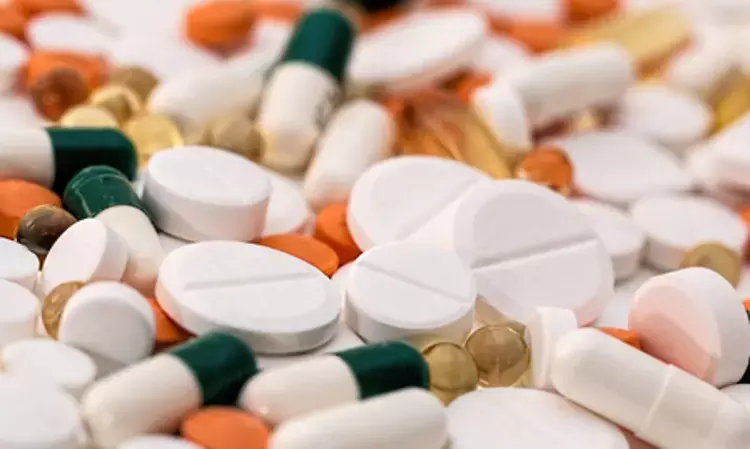- Home
- Medical news & Guidelines
- Anesthesiology
- Cardiology and CTVS
- Critical Care
- Dentistry
- Dermatology
- Diabetes and Endocrinology
- ENT
- Gastroenterology
- Medicine
- Nephrology
- Neurology
- Obstretics-Gynaecology
- Oncology
- Ophthalmology
- Orthopaedics
- Pediatrics-Neonatology
- Psychiatry
- Pulmonology
- Radiology
- Surgery
- Urology
- Laboratory Medicine
- Diet
- Nursing
- Paramedical
- Physiotherapy
- Health news
- Fact Check
- Bone Health Fact Check
- Brain Health Fact Check
- Cancer Related Fact Check
- Child Care Fact Check
- Dental and oral health fact check
- Diabetes and metabolic health fact check
- Diet and Nutrition Fact Check
- Eye and ENT Care Fact Check
- Fitness fact check
- Gut health fact check
- Heart health fact check
- Kidney health fact check
- Medical education fact check
- Men's health fact check
- Respiratory fact check
- Skin and hair care fact check
- Vaccine and Immunization fact check
- Women's health fact check
- AYUSH
- State News
- Andaman and Nicobar Islands
- Andhra Pradesh
- Arunachal Pradesh
- Assam
- Bihar
- Chandigarh
- Chattisgarh
- Dadra and Nagar Haveli
- Daman and Diu
- Delhi
- Goa
- Gujarat
- Haryana
- Himachal Pradesh
- Jammu & Kashmir
- Jharkhand
- Karnataka
- Kerala
- Ladakh
- Lakshadweep
- Madhya Pradesh
- Maharashtra
- Manipur
- Meghalaya
- Mizoram
- Nagaland
- Odisha
- Puducherry
- Punjab
- Rajasthan
- Sikkim
- Tamil Nadu
- Telangana
- Tripura
- Uttar Pradesh
- Uttrakhand
- West Bengal
- Medical Education
- Industry
Drugs and Cosmetics Act Set for Fresh Decriminalization Under Jan Vishwas Bill 2025

New Delhi: The Drugs and Cosmetics Act, 1940, key legislation governing India's pharmaceutical sector, is set for further decriminalization under the Jan Vishwas (Amendment of Provisions) Bill, 2025, introduced in the Lok Sabha by Union Commerce and Industry Minister Piyush Goyal.
Alongside the pharma law, the bill also proposes amendments to the Tea Act, 1953, Legal Metrology Act, 2009, and Motor Vehicles Act, 1988, marking the next phase of the government’s sweeping regulatory reform agenda.
Union Commerce and Industry Minister Piyush Goyal has introduced the Jan Vishwas (Amendment of Provisions) Bill, 2025, in the Lok Sabha. The bill, which was earlier cleared by the Union Cabinet, has been referred to the Select Committee by the Hon’ble Speaker for detailed examination, with a report expected by the first day of the next session.
This exercise builds on the success of the Jan Vishwas (Amendment of Provisions) Act, 2023—the first consolidated legislation to systematically decriminalize minor offenses across multiple acts. The 2023 Act, notified on 11th August 2023, decriminalized 183 provisions in 42 Central Acts administered by 19 Ministries/Departments.
Notably, the Drugs and Cosmetics Act, 1940, which was part of the 2023 reforms, is among the four acts—along with the Tea Act, 1953, Legal Metrology Act, 2009, and Motor Vehicles Act, 1988—proposed for further decriminalization under the current bill.
The 2025 Bill expands this reform agenda to cover 16 Central Acts administered by 10 Ministries/Departments. A total of 355 provisions are proposed to be amended—288 provisions decriminalized to foster ease of doing business, and 67 provisions proposed to be amended to facilitate ease of living.
The Jan Vishwas (Amendment of Provisions) Bill, 2025, also proposes 67 amendments under the New Delhi Municipal Council Act, 1994 (NDMC Act) and the Motor Vehicles Act, 1988, to facilitate ease of living.
Key features of the bill:
First-time contraventions: Advisory or warning for 76 offenses under 10 acts.
Decriminalization: Imprisonment clauses for minor, technical or procedural defaults are replaced with monetary penalties or warnings.
Rationalization of penalties: Penalties made proportionate, with graduated penalties for repeated offenses.
Adjudication mechanisms: Designated officers empowered to impose penalties through administrative processes, reducing judicial burden.
Revision of fines and penalties: Automatic 10% increase every three years to maintain deterrence without legislative amendments.
Four acts—the Tea Act, 1953; the Legal Metrology Act, 2009; the Motor Vehicles Act, 1988; and the Drugs and Cosmetics Act, 1940—were part of the Jan Vishwas Act, 2023 and are proposed for further decriminalization under the current bill.
The Jan Vishwas (Amendment of Provisions) Bill, 2025, marks a significant milestone in India’s regulatory reform journey. It reflects the government’s commitment to “Minimum Government, Maximum Governance” and will catalyze sustainable economic growth and improved ease of doing business.
Mpharm (Pharmacology)
Susmita Roy, B pharm, M pharm Pharmacology, graduated from Gurunanak Institute of Pharmaceutical Science and Technology with a bachelor's degree in Pharmacy. She is currently working as an assistant professor at Haldia Institute of Pharmacy in West Bengal. She has been part of Medical Dialogues since March 2021.


